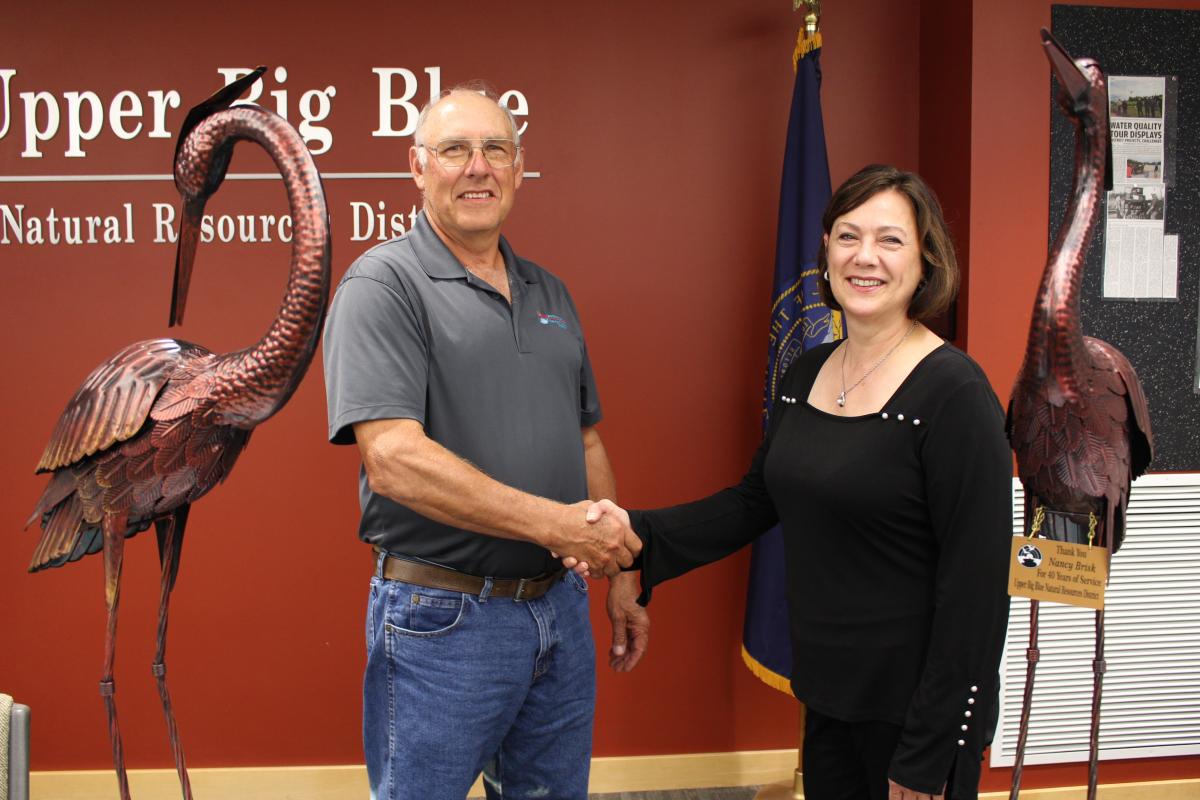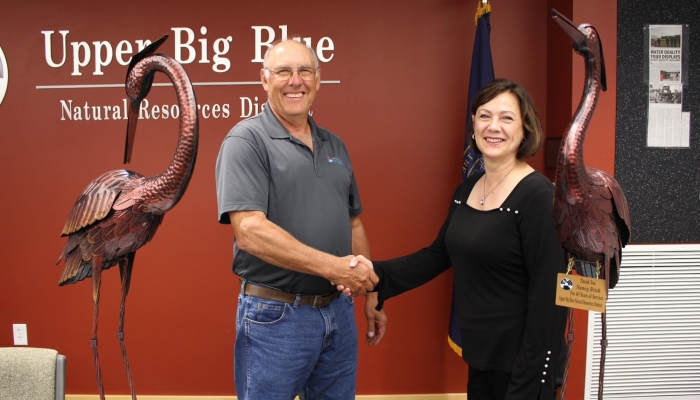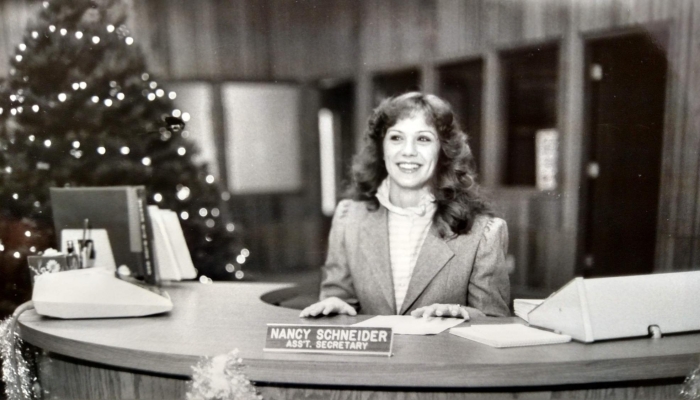‘Doing Our Best to Make Things Better’
Brisk Reflects on 40 Years with the NRD
Nancy Brisk came to the Upper Big Blue Natural Resources District for the job, but she says it’s the people and the mission of the organization that have kept her there for 40 years. “The work we are doing is very important,” she said.
And after all these years, “It feels like a family here,” she said of the staff and board members.
Brisk was recognized recently by the board of directors of the NRD for her four decades of service. She began working as an assistant secretary for the NRD in August of 1981. When she first applied for a job at the district office, she had no idea what an NRD was, she recalled with a chuckle. Longtime General Manager John Turnbull was happy to explain it to her during her interview. Brisk had experience with agriculture and was a nature enthusiast. That combined with her office skills made her the perfect person for the position.
Through the years, the job grew and Brisk took on new responsibilities. She started out typing minutes and recording stream gauge data, eventually took on payroll and accounts payable/receivable, then HR and benefits coordination. Today she is the department manager for administration and oversees a staff of secretaries and clerks. While she doesn’t measure water levels or plant trees, her work is essential to the NRD’s mission, as it undergirds the work of every employee of the district. Brisk particularly enjoys the parts of her job linked to helping communities with park improvements, tree plantings, or flood mitigation projects.
Brisk has seen lots of changes in technology over the course of her career with the NRD. In her early days at the NRD, there was a single computer terminal linked to a server at UNL. You had to save frequently as the link was temperamental, she explained. Occasionally it winked out and a half-day of data would be lost. Eventually the NRD got a computer that didn’t rely on the UNL connection, but it was still the only computing device for the whole office. Staff members had to reserve time to use the much sought-after machine with its noisy dot matrix printer.
Brisk’s trusty typewriter eventually gave way to a computer with word processing software. She was not sorry to say goodbye to the tedious process of formatting documents manually and making corrections with White Out. She was similarly enthusiastic when the district got its first accounting software, which transformed her job. Previously, payroll was done by hand in one day. Employees would turn in their timecards on payday and she would compute everything manually, then print checks to distribute at the end of the workday. Paying bills and managing annual tree sales was just as labor intensive and required Brisk’s trademark attention for detail.
The NRD is governed by a locally elected board of directors, which meets monthly to direct the work of the NRD staff and vote on policy measures. Of the 60 or so board members to serve the NRD since its inception, Brisk estimates she has served alongside at least 50 of them, attending somewhere in the range of 1,200 committee and board meetings through the years. Two long-serving current members of the board, Doug Dickinson and Larry Moore, have worked with Brisk since her first day. Brisk says occasionally there have been board members who were challenging to work with, but that often the ones that start out adversarial end up being beneficial members of the group.
Brisk reflected on the shifting demographics of the board, noting that when she started with the NRD the group was all male and all farmers. Eventually women joined, as well as people from other professions and industries. Each brought important perspectives and ideas to share. Brisk is pleased that today, younger people are taking an interest in serving on the board. “Don’t just complain about things,” she encourages people. “Get involved and work to fix what you don’t like.”
Relationships between the board of the NRD and the public that they serve has been tumultuous through the years, Brisk recalls. In the 80s, ensuring water quantity was a much bigger concern than protecting quality, and some producers worried that the NRD was going to limit their access to irrigation. The NRD has done more outreach and education to get everyone on the same page about conservation since then, said Brisk. “Our relationship with the farmers is much better than it used to be. Most of them don’t think we’re out to get them anymore.”
Through the years, the NRD has taken on larger projects and offered more programs. Keeping all the paperwork in order and moving forward on large projects with multiple partners, from local communities to state and federal agencies, is a big challenge. “There are sometimes a lot of hoops to jump through to get things done,” she said. “There’s always more paperwork to do and details to manage.”
Taking on more hiring and management responsibilities has been a growth opportunity for Brisk as well. “The more your staff grows, the more diverse you become and sometimes it is harder to get everyone to work together and get along,” she said. When she began with the NRD, there were 10 employees in the York office and five field office staff in county NRCS offices. Now there are 27 employees total, nine of whom she supervises.
When she’s not working, Brisk enjoys gardening and making stained glass art at her home near Henderson, as well as visiting her children and their families. Brisk has come a long way from the assistant secretary fresh out of college who didn’t even know what an NRD was. She is proud to have spent a majority of her career engaged in work that is meaningful to her. “We are doing good work. We’re doing what we can to improve people’s lives and leave something better for our kids and grandkids. I wish more people understood how hard we work to take care of the land and the water. We really are doing our best to make things better,” she said.
Brisk was recently recognized by the Board of Directors of the Upper Big Blue NRD. She is pictured here with chairperson Lynn Yates.

Nancy Brisk came to the Upper Big Blue Natural Resources District for the job, but she says it’s the people and the mission of the organization that have kept her there for 40 years. “The work we are doing is very important,” she said.
And after all these years, “It feels like a family here,” she said of the staff and board members.
Brisk was recognized recently by the board of directors of the NRD for her four decades of service. She began working as an assistant secretary for the NRD in August of 1981. When she first applied for a job at the district office, she had no idea what an NRD was, she recalled with a chuckle. Longtime General Manager John Turnbull was happy to explain it to her during her interview. Brisk had experience with agriculture and was a nature enthusiast. That combined with her office skills made her the perfect person for the position.
Through the years, the job grew and Brisk took on new responsibilities. She started out typing minutes and recording stream gauge data, eventually took on payroll and accounts payable/receivable, then HR and benefits coordination. Today she is the department manager for administration and oversees a staff of secretaries and clerks. While she doesn’t measure water levels or plant trees, her work is essential to the NRD’s mission, as it undergirds the work of every employee of the district. Brisk particularly enjoys the parts of her job linked to helping communities with park improvements, tree plantings, or flood mitigation projects.
Brisk has seen lots of changes in technology over the course of her career with the NRD. In her early days at the NRD, there was a single computer terminal linked to a server at UNL. You had to save frequently as the link was temperamental, she explained. Occasionally it winked out and a half-day of data would be lost. Eventually the NRD got a computer that didn’t rely on the UNL connection, but it was still the only computing device for the whole office. Staff members had to reserve time to use the much sought-after machine with its noisy dot matrix printer.
Brisk’s trusty typewriter eventually gave way to a computer with word processing software. She was not sorry to say goodbye to the tedious process of formatting documents manually and making corrections with White Out. She was similarly enthusiastic when the district got its first accounting software, which transformed her job. Previously, payroll was done by hand in one day. Employees would turn in their timecards on payday and she would compute everything manually, then print checks to distribute at the end of the workday. Paying bills and managing annual tree sales was just as labor intensive and required Brisk’s trademark attention for detail.
The NRD is governed by a locally elected board of directors, which meets monthly to direct the work of the NRD staff and vote on policy measures. Of the 60 or so board members to serve the NRD since its inception, Brisk estimates she has served alongside at least 50 of them, attending somewhere in the range of 1,200 committee and board meetings through the years. Two long-serving current members of the board, Doug Dickinson and Larry Moore, have worked with Brisk since her first day. Brisk says occasionally there have been board members who were challenging to work with, but that often the ones that start out adversarial end up being beneficial members of the group.
Brisk reflected on the shifting demographics of the board, noting that when she started with the NRD the group was all male and all farmers. Eventually women joined, as well as people from other professions and industries. Each brought important perspectives and ideas to share. Brisk is pleased that today, younger people are taking an interest in serving on the board. “Don’t just complain about things,” she encourages people. “Get involved and work to fix what you don’t like.”
Relationships between the board of the NRD and the public that they serve has been tumultuous through the years, Brisk recalls. In the 80s, ensuring water quantity was a much bigger concern than protecting quality, and some producers worried that the NRD was going to limit their access to irrigation. The NRD has done more outreach and education to get everyone on the same page about conservation since then, said Brisk. “Our relationship with the farmers is much better than it used to be. Most of them don’t think we’re out to get them anymore.”
Through the years, the NRD has taken on larger projects and offered more programs. Keeping all the paperwork in order and moving forward on large projects with multiple partners, from local communities to state and federal agencies, is a big challenge. “There are sometimes a lot of hoops to jump through to get things done,” she said. “There’s always more paperwork to do and details to manage.”
Taking on more hiring and management responsibilities has been a growth opportunity for Brisk as well. “The more your staff grows, the more diverse you become and sometimes it is harder to get everyone to work together and get along,” she said. When she began with the NRD, there were 10 employees in the York office and five field office staff in county NRCS offices. Now there are 27 employees total, nine of whom she supervises.
When she’s not working, Brisk enjoys gardening and making stained glass art at her home near Henderson, as well as visiting her children and their families. Brisk has come a long way from the assistant secretary fresh out of college who didn’t even know what an NRD was. She is proud to have spent a majority of her career engaged in work that is meaningful to her. “We are doing good work. We’re doing what we can to improve people’s lives and leave something better for our kids and grandkids. I wish more people understood how hard we work to take care of the land and the water. We really are doing our best to make things better,” she said.
Brisk was recently recognized by the Board of Directors of the Upper Big Blue NRD. She is pictured here with chairperson Lynn Yates.



